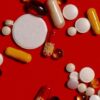Why take GERD drugs when you can change your diet? Many people would ask the opposite question, why not eat what you like if you can?
In the case of GERD (gastroesophageal reflux disease), many sufferers can eliminate symptoms without popping a pill and risking side effects, such as heart disease, vitamin deficiency, and bone fractures. Medical experts have found that by eliminating certain foods from the diet, adding others and watching portion size, GERD can be prevented and treated almost entirely for many people.
Let’s look at the facts: A whopping 116 million prescriptions are written for GERD each year, according to estimates from ClinCalc.com, based on data from the government’s Medical Expenditure Panel Survey. Prilosec, a proton pump inhibitor (PPI), which acts to reduce stomach acid production, is the eighth-most commonly prescribed drug in the United States. Prilosec and a number of other GERD drugs are now available over the counter, making them even more accessible to adults who suffer from frequent heartburn (the most common symptom of GERD) and contributing to the approximate $5.6 billion that was spent on drugs for GERD (in 2016, according to Grand View Research).
TV ads for drugs to alleviate heartburn are rampant, causing some doctors to be concerned. “Heartburn commercials are positioning the drugs as a way to give people the freedom to eat a horrible diet without suffering the consequences,” says Joel Fuhrman, M.D., a board-certified family physician, author of Eat for Life: The Breakthrough Nutrient-Rich Program for Longevity, Disease Reversal, and Sustained Weight Loss. (HarperOne, 2020), and a nutritional researcher who specializes in preventing and reversing disease through nutritional and natural methods. Beyond that, “people don’t know that PPIs can increase the risk of heart disease, hip fractures, and kidney damage — these are serious potential side effects,” he adds.
Browse This Article
Overuse of GERD drugs
Although PPIs are only meant for short-term use, overuse of the medications occurs in up to 70% of patients. Lead author David Jacobs, PharmD, PhD, assistant professor of pharmacy practice at the University at Buffalo School of Pharmacy and Pharmaceutical Sciences, noted that doctors need to be educated on the dangers of overuse of PPIs and deprescribing initiatives developed.
Experts agree that many of the side effects associated with PPIs are compounded by the fact that people take them regularly and over the long term, even though they are meant as short-term remedies. OTC labeling states that PPIs should only be taken for 14 days at a time maximum, and only up to three times per year. “You really want to encourage patients to take the lowest effective dose that manages symptoms effectively, for the shortest possible duration,” says Andrew Chan, MD, a gastroenterologist at Massachusetts General Hospital.
What is GERD
GERD-Heartburn Connection Heartburn — a burning sensation felt in the stomach, chest or back of the throat — is the most common symptom of GERD. When heartburn persists and happens more than twice a week, GERD is present. Heartburn occurs when the lower esophageal sphincter doesn’t close properly and the contents of the stomach leak back into the esophagus. Since the stomach acid is literally touching the esophagus, a burning sensation results. According to the American College of Gastroenterology, more than 60 million Americans experience heartburn at least once a month, and 15 million have heartburn symptoms daily. According to a study in the journal Gut, up to about 28% of North Americans suffer from GERD.
Other Symptoms of GERD are the regurgitation of stomach acid into the mouth, difficulty and/or pain when swallowing, chest pain, excessive clearing of the throat, burning sensation in the mouth.
What to eat, and what not to eat if taking GERD drugs
“A diet that’s greasy, oily, and high in meat and fatty snacks will produce a higher secretion of acid and digestive proteins,” says Dr. Fuhrman. “The human body has a somewhat limited ability to digest proteins — we’re not lions, we’re better adapted to a plant-focused diet,” he adds.
In a study published in JAMA Otolaryngology-Head & Neck Surgery, people with a condition similar to GERD, laryngopharyngeal reflux — acid travels up the esophagus to reach the throat — that closely followed a Mediterranean diet saw a better improvement in reflux symptoms than those who were taking PPIs.
The Mediterranean diet is plant and whole foods-based, and focuses on eating fruits, vegetables, grains and nuts. Dairy and animal products — such as beef, chicken and pork — are largely cut out. Researchers enrolled 184 people with laryngopharyngeal reflux. Participants either received a PPI and standard advice to reduce reflux or were treated with a 90% plant-based, Mediterranean diet, alkaline water and standard advice.
About 63% of those on the Mediterranean diet achieved a meaningful reduction in reflux symptoms, compared to 54% who took a PPI, results showed. The average reduction in the reflux symptom index for those who changed their diet was 40%. For those who took a PPI, it was 27%.
The study’s lead author, Craig H. Zalvan, MD, medical director of The Institute for Voice and Swallowing Disorders at Phelps Hospital in Sleepy Hollow, NY, used to be one of the biggest prescribers of PPIs in the area. But he thought there had to be a better treatment for reflux and through research, developed a plant-based diet for some of his patients.
“Although effective in some patients, I felt medication couldn’t be the only method to treat reflux and recent studies reporting increased rates of stroke and heart attack, dementia and kidney damage from prolonged PPI use made me more certain,” Zalvan said in a statement. “The results we found show we are heading in the right direction to treating reflux without medication.”
In short, more plants equal less heartburn, Dr. Fuhrman notes. “GERD goes away easily for a person eating a plant-based diet. Think ‘G-BOMBS’ – greens, beans, onions, mushrooms, berries, and seeds. Add in things like winter squash, corn, beets, and grains, and eliminate processed foods, and you’re likely to see symptoms disappear,” he says. On top of that, try juices made at home in a blender with green cruciferous veggies like cabbage or kale. These nutrient-rich foods promote a healthy digestive tract lining and reduce acid in the stomach. Also, don’t forget whole, unprocessed carbs, such as whole grains and breads, whole wheat pasta, and brown rice. These complex carbs make it easier to absorb stomach acid. Lean proteins like chicken and fish are other good bets for GERD sufferers.
GERD sufferers should eat five to six small meals a day rather than three larger ones, as too much food triggers excess acid production in the stomach. (Eat your last meal at least three hours before bedtime.) Be sure to drink a minimum of eight glasses of water a day, which helps to dilute stomach acid. If possible, drink liquids between meals, rather than with them.
Foods to Avoid
Foods that produce excess stomach acid ideally should be off-limits. These include citrus (oranges, grapefruits, lemons, and limes), chocolate, spicy foods, tomato-based foods (spaghetti sauce, pizza, and chili), raw garlic, fried and high-fat foods (including fatty cuts of meat), mint flavorings, and caffeinated beverages (coffee, tea, cola). Drinking alcohol and smoking also worsen symptoms.
Link to Excess Weight and Obesity
Being overweight (or obese) contributes to GERD. Multiple studies have shown that obesity is a risk factor for GERD as well as complications of GERD, such as erosive esophagitis and esophageal cancer. A British study of more than 10,000 people, ages 20 to 59, published in the International Journal of Epidemiology, found that study participants who were above a normal weight were more likely to suffer from heartburn and acid regurgitation. Participants who were obese were nearly three times as likely to experience these symptoms.
Foods that are bad for the waistline also exacerbate heartburn. For example, foods high in saturated fats take longer to digest. Because they remain in the stomach longer, they trigger more stomach acid, which can lead to GERD symptoms. Oversized portions force the stomach to stretch, putting pressure on the lower esophageal sphincter — the muscle that keeps stomach acids from moving into the esophagus. Bottom line: The best diet for a healthy weight (small portions and a limited intake of saturated fat) is also the best diet to help prevent GERD symptoms.
Supplements Talk to your doctor before taking any supplements or herbal remedies if you suffer from GERD, as some can make symptoms worse
GERD-Causing drugs Some cases of GERD can actually be caused by prescription or OTC drugs. Speak to your healthcare practitioner if you have persistent heartburn and take any medications. Following are some that may cause problems:
- Anxiety medications
- Antibiotics
- Antidepressants
- High blood pressure medications
- Pain relievers
“The American diet is a disease-causing diet, which has made us a sickly nation,” Dr. Fuhrman concludes. But by moving toward a plant-based diet and taking other dietary precautions, GERD and other common conditions can be treated or even prevented.
Common GERD Drugs
PPIs are available both by prescription and OTC (Nexium, Prilosec, Prevacid, Protonix, AcipHex) and antacids (Alka-Seltzer, Pepto-Bismol, Maalox, Tums, Rolaids).
PPIs work by blocking the enzyme system known as the proton pump, found in the parietal cells — cells in the stomach lining that create acid. When the enzymes are blocked, the acid becomes weaker. It can take the parietal cells about 24 hours or longer to secrete more acid, which is why PPIs offer long-lasting relief.
Antacids (OTC) contain quick-acting ingredients like calcium carbonate and sodium bicarbonate, which neutralize stomach acids.
Possible side effects of OTC PPIs are the same as for prescriptions: heart attack, fracture (particularly hip, wrist or spine), kidney disease, iron/vitamin B12 deficiency, headache, diarrhea due to bacterial infection with Clostridium difficile, nausea, dementia.
Antacids for gastrointestinal symptoms. Brands with magnesium (Maalox) may cause diarrhea. Brands with calcium (Tums) or aluminum (Mylanta) may cause constipation.
Antacids or PPIs may interact with a number of other drugs by interfering with their absorption, including some antibiotics, antivirals, blood thinners, heart drugs and many others. Potential side effects can be intensified for those with high blood pressure or kidney disease or those on a low-sodium diet.
Risks of long-term use
Heart failure and death – Findings reported in the journal PLOS ONE note that patients with existing heart disease (coronary artery disease) may increase their risk of heart failure and death when using PPIs.
Kidney damage
Long-term use of PPIs (as compared to H2 blockers) may also lead to kidney damage, according to multiple studies. In one study in the journal Kidney International, researchers looked at the medical records of more than 125,000 people who had been prescribed PPIs for five years.
Those on PPIs (like Nexium, Prevacid, and Prilosec) had a higher risk of developing chronic kidney disease and acute kidney injury compared to patients who had taken H2 blockers, another class of heartburn meds, the researchers reported. H2 blockers include Pepcid and Zantac.
A 2019 analysis of an FDA side effects database also found that taking PPIs (GERD drugs) is associated with an increased risk of kidney disease. Researchers examined data from the FDA Adverse Event Reporting System (FAERS) database. They narrowed their study to reports on 43,000 people who took a PPI and no other medications and 8,000 people who took H2 blockers.
The researchers found that those who took only PPIs were 28.4 times more likely to have chronic kidney disease, 35.5 times more likely to report end-stage renal disease and 4.2 times more likely to have acute kidney disease compared to those on H2 blockers.
“Although [H2 blockers] have not been shown to be as effective as PPIs, they might be considered as alternatives for patients who are at high risk for developing renal and electrolyte imbalances,” the researchers concluded.
A 2019 study in the journal Pharmacotherapy found that routine use of PPIs increased the risk of kidney failure four-fold. Researchers examined health data on more than 190,000 patients over a 15-year period in a retrospective study. None of the patients had existing kidney disease at the start. Researchers compared patients who were eventually given a PPI and those who weren’t ever given one.
The researchers found that those on a PPI had a 20% increased risk of chronic kidney disease compared with those not on a these GERD drugs. In addition, those on a PPI were four times more likely to experience kidney failure. The study authors noted that the risks were highest in those 65 and older.
Osteoporosis
A study in the International Journal of Rheumatic Diseases revealed that PPIs may lead to weaker bones. Researchers in Iran followed 80 patients over two years, half of whom used a PPI daily. Those on a PPI were more likely to have osteoporosis in their femur (thigh bone) as well as a condition known as osteopenia, which is decreased bone density. In a 2011 drug safety communication the FDA advised healthcare professionals of the risk for fracture if they are recommending the use of OTC PPIs at higher doses or for longer periods of time than the drug’s label advises.
Cirrhosis complications
According to a study in the journal Hepatology, taking PPIs may cause loss of brain function and a bacterial infection in people with cirrhosis of the liver. Researchers in Denmark followed 895 patients with either cirrhosis or a condition known as ascites, which is fluid buildup in the abdomen. The original purpose of the study was to examine the effectiveness of a treatment for ascites. A total of 52% of the patients enrolled used a GERD drugs at some point during the trial.
Those who had taken a PPI had a 31% one-year cumulative risk for hepatic encephalopathy (HE), a loss of brain function when the liver has trouble excreting toxins out of the bloodstream, the researchers reported. The risk for those who did not take a PPI was 25%.
“The findings that PPI use is a risk factor for [spontaneous bacterial peritonitis (SBP)] and that SBP (a bacterial infection) is a risk factor for HE do provide support for the hypothesis that PPIs contribute to the development of HE by promoting translocation of gut bacteria,” the researchers wrote.
PPIs were developed to reduce the production of gastric acid in the gut, as well as increase the pH in the stomach. However, by doing so, they can also cause gut bacteria to multiply and enter the blood and lymph nodes. This can then lead to SBP and hepatic encephalopathy.
Bacterial infections and C. Diff – Ample research has made experts aware of the association between PPI use and bacterial infections, including infection with the bacterium Clostridium difficile (C. diff), which causes severe diarrhea. But the association between PPI use and viral infections has not been studied as well. A 2019 study in JAMA Network Open revealed that long term PPI use puts people at risk for acute gastroenteritis, a viral infection that is commonly spread during winter months. People age 45 and older who took PPIs had double the risk of this viral infection, which causes stomach pain, diarrhea, and vomiting.
Stroke
Taking PPIs also may boost your risk for a stroke according to research presented at an American Heart Association annual meeting. Based on the medical records of more than 244,000 Danish patients who had received an endoscopy, those who were taking a PPI had a 21% higher overall stroke risk. The greater the dose of a PPI taken, the higher the stroke risk, the researchers said, noting those who took the lowest doses of the antacids had only a slight or no increased risk. And there was no higher risk with H2 blockers.
Heart attack
A study from Stanford University researchers suggests that PPI use is associated with a greater risk of heart attacks. After combing through 16 million electronic records of 2.9 million patients in two separate databases, the researchers found that people who take PPIs are 16% to 21% more likely to suffer a heart attack.
Stomach cancer
Long-term use of PPIs has also been associated with a significant increase in the risk of stomach cancer. In a study in the journal Gut, researchers looked at more than 60,000 adults who had taken a combination of a PPI and two antibiotics to kill H. pylori bacteria for seven days. Eliminating that bacteria from the gut can significantly lower a person’s risk of developing stomach cancer. However, many people continue to take a PPI regularly after the bacteria has been eliminated, often for years.
The patients were then monitored for an average of 7 ½ years. The researchers compared those who were taking PPIs with those taking H2 blockers. Those on PPIs had a 2.4 times higher risk of developing stomach cancer, the researchers reported. However, taking an H2 blocker was not linked to a higher risk. The risk also increased the more frequently a PPI was used. Daily use was associated with a 4.5 times higher risk of developing stomach cancer compared with weekly use.
Also, the longer a PPI was used, the greater the risk. After more than a year of use, the risk of stomach cancer increased five-fold; six-fold after two or more years; and more than eight-fold after at least three years. The study’s authors say that doctors should exercise caution when telling patients to take a PPI for a long period of time.
All cause death
In another study, published in BMJ Open, researchers reviewed prescription records from about 6 million veterans. They then conducted several comparative analyses. One compared those taking PPIs with those taking histamine H2 blockers. Another compared PPI users and users of other acid reducing drugs that weren’t H2 blockers. The third compared users of PPIs with those taking neither PPIs nor H2 blockers. Patients were tracked for an average of six years, or until death.
Those on PPIs had a 25% higher risk of death from all causes compared to those on H2 blockers, the researchers reported. Other comparisons found that the death rate was 15% higher for PPI users compared to those who didn’t use PPIs but could have taken an acid-reducing medication other than an H2 blocker, such as Tums. Another comparison found the death rate was 23% higher in those taking a PPI compared to those who didn’t take any acid reflux drugs.
The researchers found that those taking PPIs were more likely to die during the study period whether or not they had cardiovascular disease, a history of pneumonia, and no matter their age. Longer use and having no medical need for PPIs put people at particularly high risk of death.
The researchers point to a growing body of evidence showing a host of adverse events associated with PPI use and the high prevalence of PPI use, leading them to conclude that the drugs’ use should be limited to instances and durations where it is medically indicated. When it comes to use of PPIs, there is a “need to exercise judicious use of PPIs and limit use and duration of therapy to instances where there is a clear medical indication and where benefit outweighs potential risk,” the authors concluded.
Stops throat cancer
On the other hand, taking a high dose of acid-reducing medicine such as Nexium in combination with aspirin may help thwart throat cancer, according to findings presented at an American Society of Clinical Oncology meeting and published in The Lancet. Researchers randomly assigned 2,563 people with Barrett’s esophagus — a precursor to developing esophageal cancer — to four treatment groups: the high dose PPI Nexium with aspirin, a high dose of the PPI without aspirin, a low dose of Nexium with aspirin and a low dose of Nexium without aspirin. After following the patients for nearly nine years, researchers found that patients taking a high dose of Nexium with a low-dose aspirin for at least seven years had a moderately reduced risk of developing esophageal cancer. “Based on these data, we believe people with heartburn should talk with their doctor about their risk of Barrett’s esophagus, but they should not self-medicate with these medications,” said lead study author Janusz Jankowski, MD.
Allergies
Researchers have long suspected that the use of antacid drugs puts people at risk for developing allergies, but the only studies available testing this theory were animal studies and observational studies in humans. In a 2019 study in the journal Nature Communications, researchers reviewed health insurance claim data for about 8 million people and determined that people who had been prescribed an acid-reducing drug were around twice as likely to be prescribed a drug for allergy symptoms later. The researchers noted: “Our findings confirm an epidemiological association between gastric acid suppression and development of allergic symptoms.”
Rebound effect of GERD drugs
And a study published in Gastroenterology revealed that healthy adults taking PPIs during an 8-week research period developed acid reflux symptoms after going off the drugs. This led researchers to speculate that PPIs can cause a “rebound effect” (making initial symptoms worse) and potentially making patients dependent on the medication. (See MedShadow’s The Purple Pill Problem: PPIs and Serious Side Effects)







